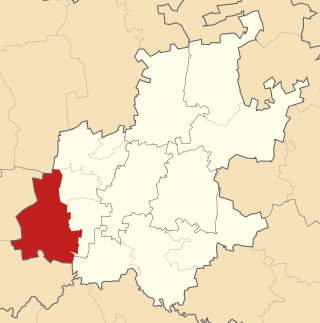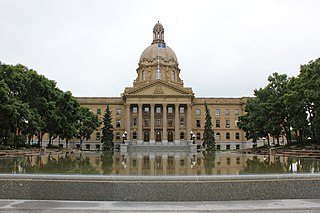A constitutional amendment is a modification of the constitution of a polity, organization or other type of entity. Amendments are often interwoven into the relevant sections of an existing constitution, directly altering the text. Conversely, they can be appended to the constitution as supplemental additions, thus changing the frame of government without altering the existing text of the document.

The Constitution of South Africa is the supreme law of the Republic of South Africa. It provides the legal foundation for the existence of the republic, it sets out the rights and duties of its citizens, and defines the structure of the Government. The current constitution, the country's fifth, was drawn up by the Parliament elected in 1994 in the South African general election, 1994. It was promulgated by President Nelson Mandela on 18 December 1996 and came into effect on 4 February 1997, replacing the Interim Constitution of 1993. The first constitution was enacted by the South Africa Act 1909, the longest-lasting to date. Since 1961, the constitutions have promulgated a republican form of government.

The National Council of Provinces (NCOP) is the upper house of the Parliament of South Africa under the (post-apartheid) constitution which came into full effect in 1997. It replaced the former Senate, but is very similar to that body, and to many other upper houses of legislatures throughout the world, in that its purpose is to represent the governments of the provinces, rather than directly representing the people.

The Parliament of Pakistan is the supreme legislative body of the Islamic Republic of Pakistan. It is a bicameral federal legislature, composed of the President of Pakistan and two houses: the Senate and the National Assembly. The president, as head of the legislature, has the power to summon or prorogue either house of the Parliament. The president can dissolve the National Assembly, only on the Prime Minister's advice.
Before 1982, modifying the Constitution of Canada primarily meant amending the British North America Act, 1867. Unlike most other constitutions, however, the Act had no amending formula; instead, changes were enacted through Acts of the Parliament of the United Kingdom called the British North America Acts.
Since the Constitution of Canada was patriated, in 1982, ten Amendments to the Constitution of Canada have been passed. There have, however, been a number of unsuccessful attempts to amend the Constitution in accordance with its amending formula.

The South Africa Act 1909 was an Act of the Parliament of the United Kingdom that created the Union of South Africa out of the former Cape, Natal, Orange River, and Transvaal colonies. The Act also allowed for potential admission of Rhodesia into the Union, a proposal rejected by Rhodesian colonists in a 1922 referendum. The draft proposal was supported by the four colonial parliaments, but was opposed by Cape Colony premier W. P. Schreiner, who raised concerns that it would strip rights from non-white South Africans.
The Eighteenth Amendment of the Constitution of Pakistan was passed by the National Assembly of Pakistan on April 8, 2010, removing the power of the President of Pakistan to dissolve the Parliament unilaterally, turning Pakistan from a semi-presidential to a parliamentary republic, and renaming North-West Frontier Province to Khyber Pakhtunkhwa. It also gave Self-governing, legislative and financial autonomy to the Provinces. The package was intended to counter the sweeping powers amassed by the presidency under former presidents General Pervez Musharraf and General Muhammad Zia-ul-Haq and to ease political instability in Pakistan. The bill reversed many infringements on the Constitution of Pakistan over several decades by its military rulers. The amendment bill was passed by the Senate of Pakistan on April 15, 2010 and it became an act of parliament when President Asif Ali Zardari put his signature on the bill on April 19, 2010. It was the first time in Pakistan's history that a president relinquished a significant part of his powers willingly and transferred them to parliament and the office of the prime minister.

The Sixth Amendment of the Constitution of South Africa made a number of changes, most importantly giving the title of "Chief Justice" to the head of the Constitutional Court instead of the head of the Supreme Court of Appeal. It was passed by the National Assembly with the requisite two-thirds majority on 1 November 2001, and signed by President Thabo Mbeki on 20 November; it was published and came into force on the following day.

The Seventh Amendment of the Constitution of South Africa made various changes involving the financial management of national and provincial government. Most of its provisions came into force on 26 April 2002, and the remainder on 1 December 2003.

The Eighth Amendment of the Constitution of South Africa allowed members of municipal councils to cross the floor from one political party to another without losing their seats. It came into force on 20 June 2002, and was effectively repealed on 17 April 2009 by the Fifteenth Amendment.

The Ninth Amendment of the Constitution of South Africa modified the scheme for the allocation of seats in the National Council of Provinces, to account for the possibility of changes in the party makeup of provincial legislatures. This was necessary because of other legislation which had been introduced to allow members of the provincial legislatures to cross the floor without losing their seats. It came into force on 20 June 2002, and was effectively repealed on 17 April 2009 by the Fourteenth Amendment.

The Tenth Amendment of the Constitution of South Africa altered the provisions relating to membership of the National Assembly and the provincial legislatures, to allow members of those bodies to cross the floor at certain times without losing their seats. It came into force on 20 March 2003, and was effectively repealed on 17 March 2009 by the Fourteenth and Fifteenth Amendments.

The Twelfth Amendment of the Constitution of South Africa altered the boundaries of seven of South Africa's nine provinces. It also redefined all of the provinces' geographical areas in terms of the areas of district and metropolitan municipalities, and repealed the provisions introduced by the Third Amendment that allowed municipal areas to cross provincial boundaries. A number of the boundary changes were highly controversial and led to popular protest and court challenges.

The Thirteenth Amendment of the Constitution of South Africa re-enacted provisions of the Twelfth Amendment which the Constitutional Court ruled had not been validly enacted. These provisions transferred the Matatiele Local Municipality from KwaZulu-Natal province to the Eastern Cape province.

The Fourteenth Amendment of the Constitution of South Africa repealed some of the provisions inserted into the Constitution by the Ninth and Tenth Amendments which allowed for floor-crossing, that is, allowed members of legislative bodies to move from one political party to another without losing their seats. The remaining floor-crossing provisions were repealed by the Fifteenth Amendment, which was enacted at the same time.

The Fifteenth Amendment of the Constitution of South Africa repealed some of the provisions inserted into the Constitution by the Eighth and Tenth Amendments which allowed for floor-crossing, that is, allowed members of legislative bodies to move from one political party to another without losing their seats. The remaining floor-crossing provisions were repealed by the Fourteenth Amendment, which was enacted at the same time.

The Sixteenth Amendment of the Constitution of South Africa transferred Merafong City Local Municipality from North West to Gauteng, altering the boundary between the two provinces. It alters the sections of Schedule 1A to the Constitution that define the geographical areas of the two provinces. The amendment came about in response to the ongoing, and sometimes violent, protests by the people of Khutsong, which had previously been transferred from Gauteng to the North West by the Twelfth Amendment.

The Seventeenth Amendment of the Constitution of South Africa made a number of changes to the structure of the South African judiciary. The bill for the amendment was passed by the National Assembly on 20 November 2012 with the required two-thirds majority; because it is a constitutional amendment not affecting the provinces it was not required to be voted on by the National Council of Provinces. The act was signed by President Jacob Zuma on 1 February 2013, and a presidential proclamation brought it into force on 23 August 2013. The amendment came into force simultaneously with the Superior Courts Act, 2013, which implemented a major rationalisation and restructuring of the judicial system.

The Alberta Sovereignty Within a United Canada Act, commonly known as the Alberta Sovereignty Act, is an act introduced on November 29, 2022, the first day of the fall sitting of the 4th Session of the 30th Alberta Legislature by the Premier of Alberta, Danielle Smith, and passed on December 8, 2022. The act seeks to protect Alberta from federal laws and policies that the Alberta legislature deems to be unconstitutional or harmful to Albertans or the province's economic prosperity, in areas such as natural resources, gun control, COVID-19 public health, education, and agriculture.







